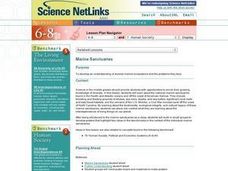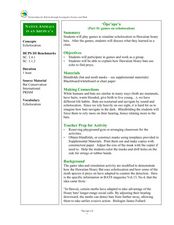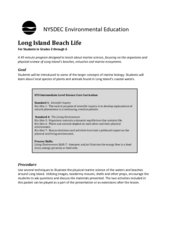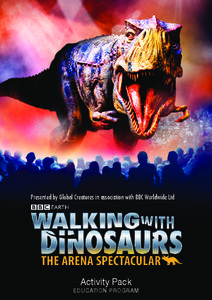Curated OER
Life Cycle of Trees
Turn your students into young tree-tectives with this fun science investigation into the life of trees. To begin, a class volunteer gets dressed up in a tree costume as the different parts of trees are introduced. Then, the class learns...
Curated OER
M&M Science and Math
A series of math and science activities feature M&M's® as manipulatives to help kids work through equations. The resource includes exercises on finding averages, percent of compositions, moles in chemical reactions, genotypes and...
Curated OER
The Web of Life
Students demonstrate the interrelationships of animals and plants. In this ecology instructional activity, students discuss the things plants and animals need for survival and study the glacier food chain. Students simulate the web of...
National Wildlife Federation
Butterfly Life Cycle
Caterpillars and butterflies each have their own unique challenges. While studying the life cycle of butterflies, learners focus on the threats to each stage. While some threats will be the same, each stage has its own unique challenge.
Curated OER
Marine Sanctuaries
Students delve into diverse marine ecosystems and the problems they face. They discover students the national marine sanctuaries found in the Pacific and Atlantic oceans and off the coast of American Samoa.
University of Colorado
Punnett Squares with Piebald Deer
Explore the science behind Earth's amazing diversity of life with this lesson plan on genetics. Looking at specific traits in piebald deer, carnations, and roan cattle, young scientists use Punnett squares to determine the possible...
American Museum of Natural History
What do You Know About Life on Earth?
Humans have only inhabited the earth for a fraction of the time that life has existed. Young scientists explore the facts about the emergence of life on Earth with an interactive resource. While highlighting different types of life, the...
American Museum of Natural History
What do You Know About Marine Biology
Show me what you know about the sea. Learners answer 10 questions about marine biology. The questions range from what evidence points to the origin of life to the biggest threat to oceans.
American Museum of Natural History
What is Marine Biology?
A marine environment covers the majority of the earth but is arguably the least understood. Teach young scientists about the characteristics of oceans and ocean species using an interactive online lesson. The in-person or remote learning...
Curated OER
My Friend, the Volcano
Working in cooperative groups, young scientists research and report on how undersea volcanic activity may benefit marine ecosystems. There are many links to websites that you can use to stimulate curiosity or for pupils to use for...
Curated OER
Games on Echolocation
Get a little batty with life science! This fun simulation game replicates how bats use echolocation to hunt moths in their native Hawaiian habitat. After creating blind folds and discussing some basic principles of echolocation, students...
Curated OER
A Lesson in Biodiversity: Making Comparisons Between Defensive Mechanisms Utilized by Marine Organisms
If your upper elementary or middle school marine biology learners are going to visit an aquarium, then here is a field trip activity guide for you. It is written specifically for The Maritime Aquarium, but the idea can be adapted to any...
Curated OER
Marine Organisms
Peek into marine life with this mathematics worksheet. A data sheet includes a list of animals and the ocean depth where they can be found. Learners use this information to write the depths as negative integers, order the depths, and...
Cornell Lab of Ornithology
Life In A Nest: Exploring Life Cycles With Bird Cams
Why read about it when you can watch it happen? Bird cams make it possible for learners to experience the life cycle of a bird in real time! An engaging set of lessons provides activities to connect their learning to bird cam...
Curated OER
Long Island Beach Life
Have your class learn about marine life through this resource. This comprehensive lesson has learners discuss marine life, learn key vocabulary, discuss environmental concerns, and play games related to migration and predator/prey...
BBC
Walking with Dinosaurs
Breath new life into your class's study of dinosaurs with this extensive collection of materials. Offering everything from a printable T-rex mask, word searches, and connect-the-dots activities to informational handouts, hands-on...
Curated OER
Turning the Tide on Trash: Marine Debris Curriculum
Six different lessons comprise this unit on marine debris. Science, language arts, social studies, and art projects make this an ideal interdisciplinary unit. The result will be well-informed future citizens who can help make a...
Curated OER
Life Cycle of a Monarch Butterfly
Students identify the stage of the butterfly's life cycle. In this life cycles lesson plan, students create a KWL chart about monarch butterflies. Students observe monarch caterpillars in an aquarium and identify the various stages of...
American Museum of Natural History
Make Your Own Marine Biology Stationary
Encourage letter writing with marine biology-themed stationary. Three versions showcase a variety of underwater creatures.
Cheetah Outreach
Life Cycles
How does a cheetah life cycle differ from a human life cycle? Kids graph weight gain for humans versus cheetahs and compare other life cycle events such as gestation and life span
Baylor College
Fuel for Living Things
During a three-part lesson, learners make a cabbage juice pH indicator and use it to analyze the waste products of yeast after feeding them with sugar. The intent is to demonstrate how living organisms produce carbon dioxide, which is...
Curated OER
Marine Biology - The Story of Waves
When teaching about the movement of water in the ocean, this PowerPoint will be a terrific support. It covers how waves break and how they are generated. The causes of tides and tsunamis are also detailed. A couple of changes could make...
Institute of Electrical and Electronics Engineers
Life Vest Challenge
After reading about the history and science of personal floatation devices, patents, and intellectual property, engineering teams design a life vest for a can of soup. To evaluate which groups considered the need for waterproofing, hold...
NASA
Is It Alive?
Determining whether or not something is living can be more difficult than it seems. Put your young scientists to work defining their own criteria to identify life, then work with three samples to see if they are alive or not.
Other popular searches
- 4th Grade Life Science
- Life Science Inquiry
- Life Science Vertebrates
- Life Science Experiments
- K 2 Life Science
- Life Science on Cells
- Life Science Lesson Plans
- Grade 4 Life Science
- Life Science Report Topic
- Australia Life Science
- The Life Science
- Life Science Lessons

























